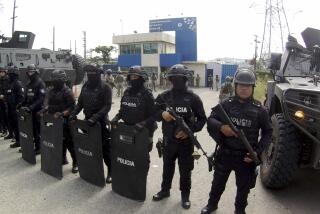U.S. Tightens Guard Around Noriega Refuge
- Share via
PANAMA CITY — A hardening determination by the Bush Administration to apprehend Manuel A. Noriega left the self-proclaimed “maximum leader” of Panama isolated inside the Vatican embassy on Monday, even as American troops used stringent measures to underline the tough U.S. stance.
While delicate diplomatic negotiations were taking place on Noriega’s fate, heavily armed American troops in effect created a one-man prison for the 54-year-old former strongman, who sought sanctuary Sunday and has indicated he seeks long-term political asylum in Spain or Cuba.
Tanks, armored personnel carriers and U.S. soldiers, their faces camouflaged with lime-green paint, blocked off one of the city’s major roads near the ornate Vatican outpost. The French ambassador, the Spanish envoy and the German charge d’affaires all had their cars stopped and searched from engine to trunk--and even beneath the carriage.
“If the Spanish ambassador goes out of the Vatican embassy with Noriega bundled in the trunk of his car, we’re going to stop them and take him out,” one American official declared.
Overhead, a specially equipped, four-engine AC-130 gunship circled slowly and endlessly, ready to open fire with an array of weapons “that could level this whole damn city,” in the words of one U.S. source.
At the same time, American troops surrounded the Cuban ambassador’s residence and bunkers bristling with assault rifles, rocket launchers and cannon were outside the closed Cuban Embassy.
Cuban political counselor Luis Delfin Perez, who said he was quoting a U.S. military official, charged in a telephone interview that “the American troops say they have orders to arrest all who come in here or leave here, including the ambassador and me.”
He said the heavily armed troops are “showing a very aggressive attitude in pointing their arms in here.”
Spanish diplomats reported that American troops Sunday night strung razor wire across their embassy’s front door, aimed weapons at the building and for a time prevented anyone, including the ambassador, from entering or leaving. Although access finally was allowed, anyone trying to enter the building Monday, including Panamanian citizens, could approach the embassy only with an armed American escort.
The large number of soldiers stationed around the diplomatic facilities are explained by American officials as necessary to prevent Noriega’s escape.
Sources said Noriega is being restricted to small, sparse quarters inside the Vatican embassy.
“There are no dirty pictures, drugs or women,” said one source, referring to the pornographic photos and large quantities of cocaine that the Americans said they found in raids last week on Noriega’s homes and offices.
Moreover, his less-than-gilded existence could go on for some time, according to American and other diplomatic officials.
“I don’t see him out in a day, a week or even years,” Javier Herrera, first secretary at the Spanish Embassy here, declared. “It could be like the Mindszenty case,” he said, referring to the circumstances of Cardinal Josef Mindszenty, the anti-Communist Roman Catholic Church leader from Hungary who spent nearly 15 years in the U.S. Embassy in Budapest after seeking political asylum in 1956.
At the moment, a similar fate faces 30 other Panamanian supporters and allies of Noriega, including his one-time puppet president, Manuel Solis Palma, who also are in the Vatican embassy under papal protection. About 10 to 20 Panamanians also are inside the Cuban ambassador’s residence.
Military roadblocks are everywhere. Panamanians walking along the streets are frequently startled by loud commands from hidden bullhorns ordering them to stop and retrace their steps.
As the Americans took near-total control of Panama City’s streets, U.S. forces also steadily moved into the Panamanian countryside and occupied areas where there have been no riots, no resistance and no loss of public order.
Lt. Col. Jerry Murguia, chief of current operations at the U.S. Southern Command, cited the “touchy situation” concerning Noriega and the Vatican as a primary reason for the moves and noted that “there is still a lot of military work to do.” He did not elaborate.
No incidents of combat have occurred for about a day and a half, and all significant resistance from pro-Noriega forces seems to have dissipated.
But if U.S. soldiers are not actually engaged in combat any more, American officials acknowledged, they are still carrying out tasks usually not assigned to foreign troops in a so-called friendly country.
For example, the security for a news conference held this week by President Guillermo Endara was provided by Defense Department agents in civilian clothing as well as uniformed American soldiers, although members of Panama’s new police force were available.
At the same time, the U.S. military is searching for and arresting civilian political supporters of Noriega even though they do not face American or Panamanian criminal charges.
Mario Runione, a one-time minister of industry and a leader of Noriega’s political party, was taken into custody Monday by American soldiers at the request of the Endara government. No charges were filed.
This followed the forceable break-in by U.S. troops Sunday at the house of Orville Goodin, a radical leftist backer of Noriega. He too was arrested by American units, although he faces no criminal charges in Panama or the United States.
One U.S. official acknowledged that the American military’s apparent willingness to pursue what may be only political vengeance on behalf of the new Panamanian government is “a serious problem.” It is difficult to sort out legitimate requests to apprehend real criminals from those seeking to punish old political foes, this source said.
Times staff writers Douglas Jehl and Bob Secter contributed to this story.
More to Read
Sign up for Essential California
The most important California stories and recommendations in your inbox every morning.
You may occasionally receive promotional content from the Los Angeles Times.













